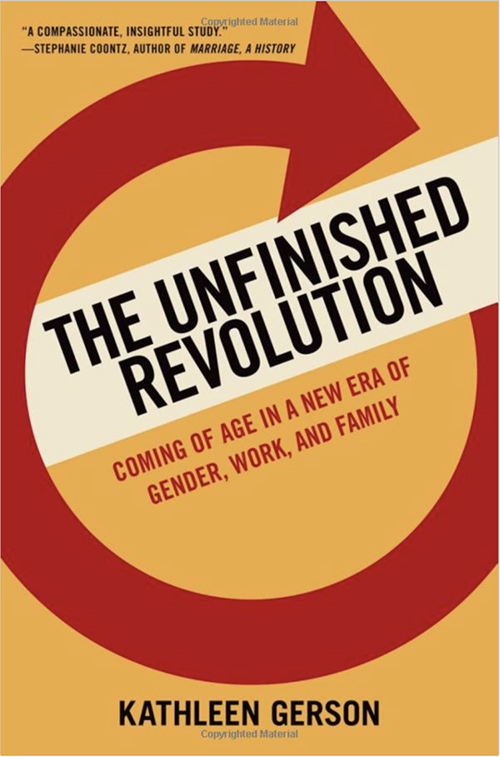
A Gen X therapist weighs in on the “middle child” generation’s unique relationship challenges
In my work as a licensed couples and sex therapist, I keep hitting the same snag with Gen X couples: They’ve been navigating their relationships in a world where all the rules changed, but no one shared the new rule book.
As the middle child of generations, this isn’t a huge surprise. We Gen Xers came of age at a time of extraordinary social and economic change. We were raised in the ‘70s and ‘80s, which was a time of dramatic shifts in gender equity (e.g., greater access to higher education, the Pill, and sexual harassment protections). During those eras, we watched our parents suffer through multiple economic crises. Our mothers entered the full-time workforce at unprecedented rates and our fathers faced a new reality in which they could not reliably be the sole breadwinner.
I keep hitting the same snag with Gen X couples: They’ve been navigating their relationships in a world where all the rules changed, but no one shared the new rule book.
Frankly, I deeply relate to my clients.
I own a private practice outside of Chicago where I work primarily with Gen X couples and women. I hold masters degrees in family counseling and secondary education, and extensive training in relationship therapy and have trained with some of the most well-known and respected experts in the world, such as Esther Perel and Terry Real. Essentially, my livelihood is based on helping couples increase their understanding of each other. However, for years I struggled to understand my own marital frustrations and getting my husband to hear me felt impossible. Through ten years of research and clinical work, I came to understand that my experience was not uncommon, and that for Gen Xers, the literal timing of our birth was wreaking havoc on our intimate relationships.

Old relationship paths are gone, but where are the new ones?
Our parents divorced at the highest rates the country has ever seen; even if they didn’t, the fear that they might was ever-present. An increasing prevalence of only one parent in the house at any time, and a dearth of childcare, ensured the “latchkey” approach stayed the norm throughout our childhood. Some say this made us the least supervised generation to date. Regardless of whether that is true, for most of us, finding our way through the world was a highly independent endeavor.
As adults, we entered a work culture that was resistant to changing its “total commitment” model of employment, which heavily depended on having an at-home partner to handle all domestic duties. At the same time, the professional world was quickly adapting to booming technological advances. The internet and smartphones made work possible anywhere and gave employers 24-7 access to employees. Rather than making work more efficient (as was promised), tech exacerbated the expectation of non-stop engagement if one wanted career advancement or, often, just to stay in place.
As adults, we entered a work culture that was resistant to changing its “total commitment” model of employment, which heavily depended on having an at-home partner to handle all domestic duties.
Through it all, Gen Xers were unwitting pioneers of uncharted territory. We worked hard to actualize the social and legislative changes that occurred in our youth, but quickly realized our path was more treadmill than escalator — lots of hustle, but no real movement.
NYU professor and expert on work, gender and family life, Dr. Kathleen Gerson, recognized what a revolutionary time Gen Xers grew up in. In her book, The Unfinished Revolution, she noted about our generation: “Now making the transition into adulthood, they have no well-worn paths to follow. Marriage no longer offers the promise of permanence, nor is it the only option for bearing and rearing children, but there is no clear route to building and maintaining an intimate bond. Work and family shifts have created an ambiguous mix of new options and new insecurities, with growing conflicts between work and parenting, autonomy and commitment, time, and money.”

Gen X relationships under pressure
It is no surprise that for many Gen Xers, life consistently feels stressful and chaotic. Few areas demonstrate this as clearly as our marriages/relationships, specifically mixed gender relationships, because they have existed within a vice grip of pressure. We are a generation of women who ostensibly could do all the things — get a great education, build a great career, choose a great partner, be a great parent — which left us with an overriding sense that we should do all the things. Not only that, but with so many options available to us, we should also do it all with vigor, drive, and perfection. So that’s what we’ve tried to do, but there are only so many hours in the day and making relationships work takes time and energy. All of this pressure has resulted in a generation of disillusioned, burned-out women, and confused, lonely men. The pandemic and our growing role as caretakers for our elderly parents have only intensified these feelings.
Gen X women, in particular, report exasperation with couples therapists who, in a misguided effort to be neutral, do not acknowledge the gender imbalances that are still so pervasive in cis-gender, heterosexual relationships.
With few models of what egalitarian marriage looks like in practice, we found we were ill-equipped for the pressures it created. In true Gen X form, many have tried to solve their relationship issues on their own, but when it doesn’t work, they are left with a pervasive sense of failure. Even when support is sought (e.g., couples therapy), we often feel misunderstood. I can’t tell you the number of times both friends and clients have shared frustrations about working with a therapist whose only solution to their issues was a ”prescription” for more date nights. Asking people who are utterly overwhelmed by the demands of their lives to somehow find additional time to do yet another thing pushes on an already-tender “I’m-failing-at-everything” wound. Gen X women, in particular, report exasperation with couples therapists who, in a misguided effort to be neutral, do not acknowledge the gender imbalances that are still so pervasive in cis-gender, heterosexual relationships. This made me irate and defeated in my own couples therapy experiences and it has been the impetus for me to challenge this approach in my work as a therapist.
In midlife, it can be easy to just say “fuck it” about our relationships. Who has the energy to deal with them? I 100% get it, but now is a critical time to repair our relationships or find those better suited to us. The research is clear — the quality of your relationships is a direct indicator of the quality of your life, and recent research shows that relationship satisfaction in midlife is the strongest predictor of healthy aging.
What I’ve learned as a Gen X couples therapist who works primarily with fellow Gen X women and couples is that we need a few good strategies for addressing relationship issues that reflect our specific life experiences.

Gen X women: Refresh your relationship perspective
- Find a new context: Sociological imagination is the ability to connect personal challenges to social issues. This is crucial for Gen Xers. Growing up with a heightened focus on individualism and blame (both rose sharply in the 1980s) makes Gen X couples susceptible to a sense of personal failing/shame and finger-pointing (at partners) when their relationships are struggling. Understanding context increases empathy and depersonalizes these issues, which in turn fosters greater critical thinking, problem solving, and growth. It moves people from “me v. you” to “us v. the world.”
Suggested exercise:
Describe a relationship frustration. Why is this happening? What is your role? What is your partner’s role? Who else do you know that is struggling with a similar frustration? If you don’t know anyone personally, who do you imagine might struggle with this? What societal, cultural, or political factors might be playing a role in your frustrations?
Invite your partner to have a conversation. Reframe this issue to make it less personal — instead of “you are the problem” focus on, “there is a problem, and we can work together against it.” Sample conversation starters: “What I’m starting to understand about our issue is…” OR “I can see now that there are outside factors impacting us…”
- Find relatable examples: As the “forgotten generation,” we are less present in media than other generations. We won’t admit to wanting to see our lives represented, but we are desperate for it. SO much of the pain Gen X couples experience is rooted in a belief that they are the only ones who are “failing.” When I tell my therapy clients how many of their peers are struggling, the relief is palpable.
Suggested exercise:
Ditch the taboo about discussing relationship problems. Share more of our messy relationship stories with each other and go out of your way to hear those of fellow Gen Xers. Be intentional about consuming media that focuses on Gen X life experiences, such as The Midst. Other examples include Postcards from Midlife (podcast), Caregiving Gen X Style (podcast), Life at the Half (podcast), Back to Her Future: Gen X Series, Books 1 & 2 (book), and Why We Can’t Sleep (book).
- Rethink domestic labor: When I was a new therapist, it was a big no-no to discuss chores because it emphasized “scorekeeping.” Well, that’s bullshit. Gen X was raised to have egalitarian expectations, but no model. This has created a mindfuck of epic proportions. Research consistently shows how much household labor impacts relationship satisfaction, sex, job functioning, parenting, and mental health—particularly when there is an imbalance.
Suggested exercise:
The Fair Play system created by author and Harvard-trained consultant Eve Rodsky is an excellent tool for exploring and balancing domestic labor. It’s available as a book and card deck, or documentary. Fair Play also offers support from trained Fair Play Facilitators.
- Reinvent your village: Our Kool-Aid was filled with the idea that we should do all the things and do it on our own. Boy did we drink it! Gen Xers need to reevaluate what it means to be independent (not relying upon anyone or anything), dependent (relying upon or being controlled by someone), and interdependent (mutually dependent, but with options and reciprocity), with a focus on that last one. Doing it all ourselves does not work. Period.
Suggested exercise: Make three columns on a piece of paper then use the words “independent, dependent, and interdependent” as the headings (one per column). Under each heading, write examples from your life that fit the definitions of that word (see above). Write as many as you can, then stop and look over your columns. Are they balanced? If not, which column has the most? Why do you think that is? What beliefs do you have that impact which column has the most items? Can any of the items from the “independent” or “dependent” column move to “interdependent?”
- Think outside of the box: Gen X’s love language is said to be cynicism, and we have a general mistrust of institutions. This makes us very open to carving new paths. We need the space to explore creative solutions to relationship problems that go beyond the binary options of monogamous marriage or divorce.
One example is a process I developed called Intentional Separation, which allows couples to take an intentional break from their relationship when needed. Other options/resources include:
- Solo living: University of Colorado professor, Peter McGraw explores being intentionally unattached
- Polywise: Psychotherapist, Jessica Fern takes a deep dive into all things open relationships and offers practical tools for explorations (Polywise on Amazon)
- Living Apart Together (LAT): In her 2024 book, LATitude: How You Can Make a Live Apart Together Relationship Work, journalist Vicki Larson explores what it’s like to be in an intimate relationship with someone, but live apart.
The fact is, relationships, even good relationships, are HARD. If yours is, you are not alone. Humans are messy and complicated, and we bring a lot more baggage with us into our relationships than we realize. If you are finding yourself feeling stuck and just kind of over it, there is a path forward.
Couples or individual therapy with the right person is, of course, a great way to address relationship issues. However, with every passing year that I do this work, I become more certain that the most successful therapy is that which explicitly explores the impact of society/culture/politics in addition to individual factors. I believe this is particularly true for Gen X because our life experiences have notoriously been understudied and unacknowledged.
With every passing year that I do this work, I become more certain that the most successful therapy is that which explicitly explores the impact of society/culture/politics in addition to individual factors. I believe this is particularly true for Gen X because our life experiences have notoriously been understudied and unacknowledged.
If therapy is not an option for you, for whatever reason, fear not. There are other ways to get unstuck. So many of us grew up in an era where “suck it up” and “no whining” was the rule of thumb for dealing with problems. I’m not suggesting that in lieu of therapy you take up bellyaching, but what I know for certain does not work is mentally beating the shit out of yourself or suffering in isolation. The people I work with who experience the most meaningful change start by taking an approach that is exactly the opposite. Therefore, a powerful first step is to acknowledge and share the imperfections in your relationships. Talk to your friends, your partner, or any trustworthy person who won’t judge you. Most importantly though — and if you do nothing else, please do this — stop judging yourself. Believe it or not, above all else, self-compassion will be your most powerful tool for change.




